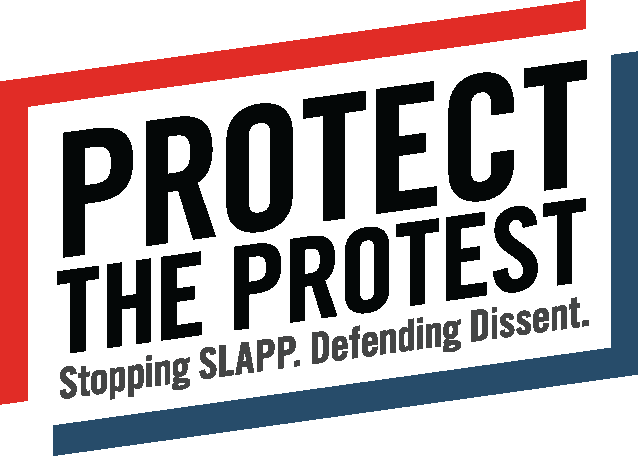U.N. must examine growing trend of U.S. corporations using courts to silence dissent, says free speech group
WASHINGTON, DC — Protect the Protest, an international task force of over 20 organizations working to protect free speech, is calling on the U.N. Human Rights Committee to address the growing trend of corporations and individuals in the United States using Strategic Lawsuits Against Public Participation (SLAPPs) to silence free speech. The task force filed a recommendation on Monday, January 14, with the committee, a body of independent experts that monitors implementation of the International Covenant on Civil and Political Rights (ICCPR). The committee is beginning its periodic review of U.S. compliance with the ICCPR in March 2019 and will first send the U.S. a list of issues to form the basis for the U.S. report to the committee. The task force is asking the committee to includes its recommendation in the list of issues.Read the ICCPR Submission here.“In recent years, there has been discernible growth in the targeted strategy of corporations and wealthy individuals using civil lawsuits to manipulate the legal process and shut down free speech by harassing and draining the resources of the people targeted,” said Charlie Holt, legal counsel at Greenpeace International. “These intimidation attempts are in direct violation of the International Covenant on Civil and Political Rights, and the U.N. Human Rights Committee must call on the United States to examine the steps the country needs to take in order to discourage this chilling trend.”Launched in September 2018, the Protect the Protest task force combines the organizational expertise and collective power of its member groups to protect free speech and stop SLAPPs. The task force builds resilience to SLAPP lawsuits by providing trainings and legal support to people who have been targeted; exposes SLAPP suits and the corporations and individuals who file them; draws attention to SLAPP suits that pose a broad threat to civil society; and advances anti-SLAPP policies and laws.The task force’s conclusions include:
- How a growing number of SLAPP lawsuits filed in the U.S. are utilizing the federal Racketeer Influenced and Corrupt Organizations (RICO) Act to bypass state anti-SLAPP laws.
- How SLAPP lawsuits relate to the ICCPR legal framework, including Article 19, the right to hold opinions without interference and the right to freedom of expression.
- That the U.S. lacks a federal law to tackle the problem of SLAPP lawsuits.
- That the U.N. Human Rights Committee and several past U.N. Special Rapporteurs on the rights to freedom of peaceful assembly and of association have made specific references to the threats posed by SLAPP lawsuits.
- Recommended questions the committee should ask the U.S. government on SLAPP lawsuits.
Protect the Protest member organizations include 350.org, Amazon Watch, American Civil Liberties Union (ACLU), Amnesty International, Center for Constitutional Rights (CCR), Center for International Environmental Law (CIEL), Civil Liberties Defense Center (CLDC), Climate Defense Project, EarthRights International (ERI), Electronic Frontier Foundation (EFF), First Amendment Project, Freedom of the Press Foundation, Greenpeace International, Greenpeace USA, Human Rights Watch, International Corporate Accountability Roundtable (ICAR), Mosquito Fleet, National Lawyers Guild (NLG), National Resource Defense Council (NRDC), PILNet, Public Citizen, Rainforest Action Network (RAN), and Stand.Earth.BACKGROUND ON ICCPRThe ICCPR is one of the core human rights instruments in international law, providing range of protections for civil and political rights, such as the right to life and human dignity; equality before the law; freedoms of speech, assembly, and association; religious freedom and privacy; freedom from torture, ill-treatment, and arbitrary detention; gender equality; the right to a fair trial, and minority rights. Governments that ratify the treaty are obligated to take measures to protect these fundamental rights, and to provide an effective remedy when these rights are violated.The United States ratified the ICCPR in 1992 and is required to comply with and implement the provisions of the treaty (subject to the "Reservations, Understandings, and Declarations" that were decided at the time of ratification). ###Media contact: Valentina StacklCommunications Manager, EarthRights Internationalvalentina@earthrights.org(202) 466 5188 x 100
